#한국어문법
Explore tagged Tumblr posts
Photo
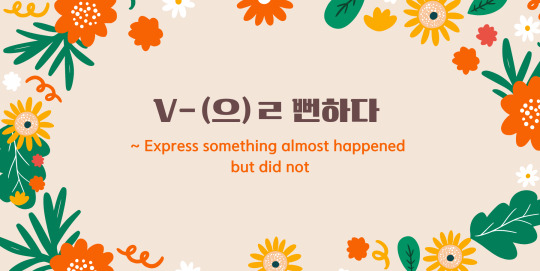
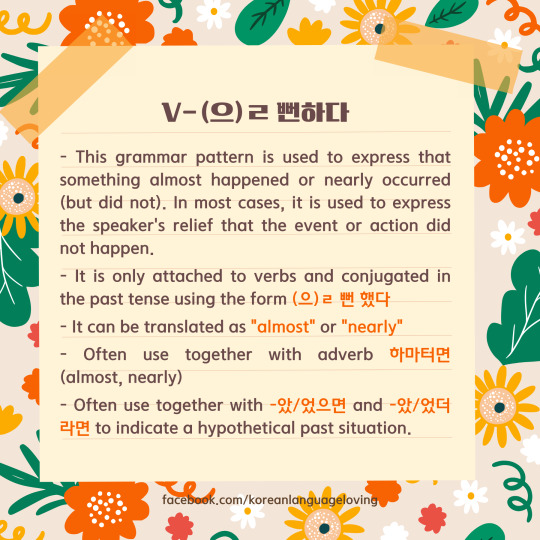
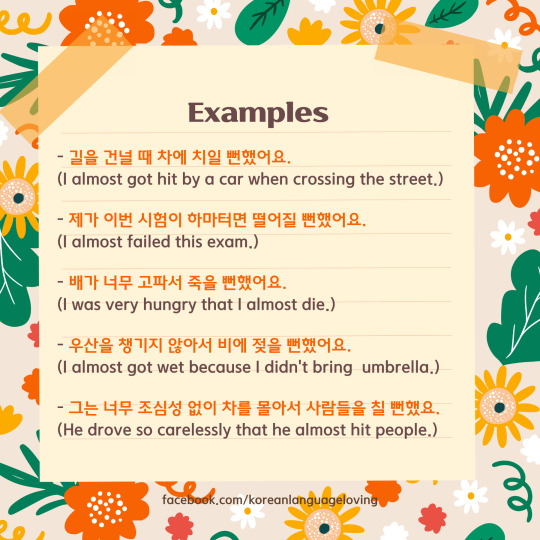
𝐊𝐨𝐫𝐞𝐚𝐧 𝐆𝐫𝐚𝐦𝐦𝐚𝐫: V-(으)ㄹ 뻔하다 ✏️ 𝐔𝐬𝐚𝐠𝐞 - This grammar pattern indicates that something was on the verge of happening or almost occurred, but ultimately did not take place. Typically, it is used to convey the speaker's sense of relief that the event or action did not happen. E.g. 길이 미끄러워서 넘어질 뻔했어요. (Because the road was slippery, I almost fell.) -> The speaker is describing a situation where they were walking on a slippery road and almost fell but didn't ✏️ 𝐒𝐩𝐞𝐜𝐢𝐚𝐥 𝐍𝐨𝐭𝐞𝐬 (1) Because this grammar pattern describes an action that almost happened but ultimately did not, it is therefore typically conjugated in the past tense using the form (으)ㄹ 뻔 했다. E.g. 영화가 너무 슬퍼서 하마터면 여자 친구 앞에서 울 뻔했어요. (Because the movie is so sad, I almost cried in front of my girlfriend.) (2) It is often used together with the adverb 하마터면 (almost, barely, nearly) E.g. 하마터면 감기가 들뻔했어요. (I almost caught a cold.) (3) This expression is often used following constructions that indicate hypothetical past situations such as -았/었으면 and -았/었더라면 E.g. 조금만 늦었으면 기차를 못 탈 뻔 했어요. (If I had been a little late, I wouldn't have been able to catch the train.) 네가 전화하지 않았더라면 약속을 잊어버릴 뻔했어요. (If you hadn't called me, I would have forgotten the appointment.) (4) This expression can also be used to exaggerate past events. In such cases, the form "아/어서 죽을 뻔하다" (literally "almost died because of [something]") is frequently used to emphasize the situation. E.g. 너무 무서워서 죽을 뻔했어요. (I was so scared that I almost died.) ✏️ 𝐂𝐨𝐧𝐣𝐮𝐠𝐚𝐭𝐢𝐨𝐧 ~ㄹ 뻔하다 Is used when the verb stem ends with a vowel. 울다 -- 울 뻔하다 = almost cried 잠을 자다 -- 잠을 잘 뻔하다 = almost slept ~을 뻔하다 Is used when the verb stem ends with a consonant. 죽다 -- 죽을 뻔하다 = almost died 넘다 -- 넘을 뻔하다 = almost passed ✏️ 𝐌𝐨𝐫𝐞 𝐄𝐱𝐚𝐦𝐩𝐥𝐞𝐬 1. 너무 피곤해서 지하철에서 졸다가 내릴 곳을 지나칠 뻔했어요 (Because I was too tired and dozed off on the subway, I almost missed my stop.) 2. 공항에 가는데 길이 너무 막혀서 비행기를 놓칠 뻔했어요. (Because there was so much traffic on my way to the airport, I almost missed my flight.) 3. 집에 오다가 바람이 너무 세게 불어서 날아갈 뻔했어요. (While coming home, the wind was blowing so strongly that I almost got blown away.) 4. 다른 사람과 부딪혀서 커피를 쏟을 뻔했어요. (I almost spilled my coffee because I bumped into someone else.) 5. 누가 쓰레기통에 불이 안 꺼진 담배를 버려서 불이 날뻔했어요. (Someone threw away a cigarette butt that was not completely extinguished in the trash can, and it almost caused a fire.) #KoreanGrammar #KoreanLanguage #studywithme
🌸 🌼 🌻
Support me at: https://koreanlanguageloving.my.canva.site/
#Korean Grammar#Grammar Rules#Learn Korean#Study Korean#Korean Language#korean langblr#learning Hangul#한국어공부중#한국어 공부하기#한국어 배우기#한국어#한국어 어휘#한국어 공부#한국어문법#한국어 문법
29 notes
·
View notes
Photo

#korean #koreanstudy #koreanlearning #koreanlanguage #koreanwords #lskorean #한국어단어 #한국어공부 #한국어 #韩语生词 #韩语学习 #韩语 #koreangrammar #韩语语法 #한국어문법 #韓文教學影片 #韓文否定 #免費學韓文 #hangeul #hangeulstudy
#한국어문법#韩语#koreangrammar#koreanstudy#koreanwords#한국어#韩语生词#koreanlearning#韓文否定#koreanlanguage#韩语语法#免費學韓文#한국어단어#韩语学习#hangeul#lskorean#korean#hangeulstudy#韓文教學影片#한국어공부
2 notes
·
View notes
Photo


Notes from the second grammar lesson from the book I am studying, 빈도별 토픽.
-ㄴ/는다 한들 means “granted that” or “even though it is/does.” It is often followed by a rhetorical question. Such as “Even if they lower the admission cost do you think more people will attend?“
update: My friend checked them and they’re correct
부지런히 돈을 모은다 한들 3 달안에 콘서트 티켓을 살 수 있을까?
아무리 재미있는 사람이라 한들 그 그녀는 웃지 않을개.
Study hard today everyone!
#는다 한들#한국어#한글#문법#한국어문법#learn korean#study korean#korean#korean language#langblr#korean vocab#korean vocabulary#learn hangul#learm hangeul#한들#koreanblr#studyblr
93 notes
·
View notes
Photo
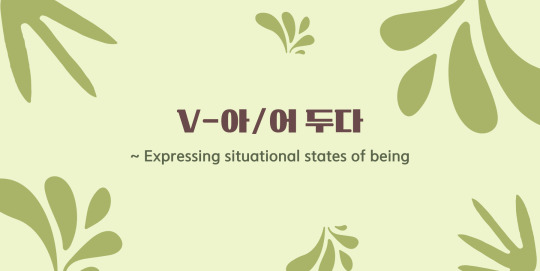
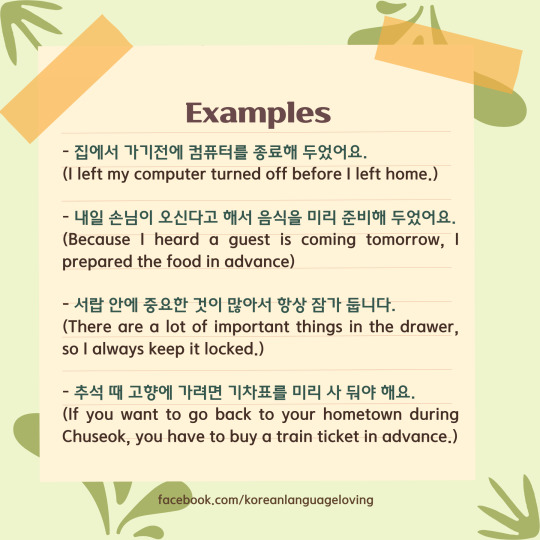
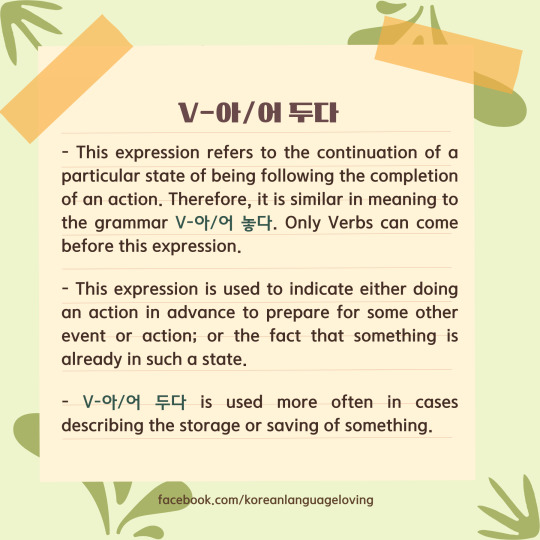
𝐊𝐨𝐫𝐞𝐚𝐧 𝐆𝐫𝐚𝐦𝐦𝐚𝐫: V-아/어 두다 ✏️ 𝐔𝐬𝐚𝐠𝐞 - The grammar pattern "아/어 두다" is used to indicate that an action is completed and that the object of the sentence is left in a certain state or condition as a result. Therefore, it is similar in meaning to the grammar 아/어 놓다. Only Verbs can come before this expression. E.g. 해외로 갈때 여권이 필요하니 여권을 만들어두어라. (Since a passport is needed when going abroad, get your passport in advance). → Indicate that the action of making a passport is completed and the passport is left in a state of being made and ready for use when needed. It can be translated as "Since a passport is needed when going abroad, make a passport and leave it ready." 출근하기 전에, 일기를 쓰고 내일 할 일을 적어두어서 까먹지 않도록 한다. (Before going to work, write a diary and write down what you need to do tomorrow so you don't forget.) → Indicate that the action of writing is completed, and the plans are left in a written form for future reference. ✏️ 𝐒𝐩𝐞𝐜𝐢𝐚𝐥 𝐍𝐨𝐭𝐞 (1) This expression is used to indicate either doing an action in advance to prepare for some other event or action or the fact that something is already in such a state. E.g. 발표할 때 실수하지 않으려면 연습을 많이 해 두세요. (In order not to make mistakes during the presentation, practice a lot in advance) * The phrase "해 두세요" is the imperative form of "해 두다" (to do in advance) and it is often used to give a suggestion or advice 여행을 가기 전에 현지 통화를 사용할 수 있도록 환전을 해두세요. (Before going on a trip, make sure to exchange currency in advance so you can use local currency.) Top of Form (2) The expression V-아/어 두다 is used almost the same way as V-아/어 놓다 and therefore in many cases two expressions can be used interchangeably. However, compared with V-아/어 놓다, V-아/어 두다 is more often used to indicate that a relatively long time has passed since a state of coming about. Hence, V-아/어 두다 is used more often in cases describing the storage or saving of something. E.g. 지수는 김치냉장고에 보관해 둔 김치로 김치찌개를 만들었어요. Jisoo made kimchi stew with kimchi stored in the kimchi refrigerator. → Indicate that the action of "보관하다" (to store) has been completed and the object, "김치" (kimchi), is left in the resulting state of being stored in the refrigerator. ✏️ 𝐌𝐨𝐫𝐞 𝐄𝐱𝐚𝐦𝐩𝐥𝐞𝐬 1. 창문을 닫을까요? - 아니요. 더우니까 그냥 열어 두세요. (Shall I close the window? - No, you can just keep it open since it’s hot.) 2. 자동차를 어떻게 샀어요? - 그동안 은행에 저축해 둔 돈으로 샀어요. (How did you manage to buy a car? - I bought it with the money I had kept saving in the bank.) 3. 생일 선물을 사러 가기 전에 생일 축하 카드를 준비해두세요. (Before going to buy a birthday gift, prepare a birthday card in advance.) 4. 공부를 할 때, 책을 읽어두어서 나중에 편하게 찾을 수 있어요. (When studying, read the books and leave them there so you can find them easily later.) 5. 승규는 학교에 가기 전에 새 연필 몇 자루를 꺼내어 예쁘게 깎아 두었어요. (Before going to school, Seunggyu took out a few new pencils and sharpened them neatly.)
#KoreanGrammar #KoreanLanguage #Studywithme
🌸 🌼 🌻
Support me at: https://koreanlanguageloving.my.canva.site/
#Korean Grammar#Korean Language#Korean Study#Study Korean#Learn Korean#korean langblr#Hangul#한국어수업#한국어#한국어공부중#한국어 연습#한국어 배우기#한국어공부#한국어문법#한국어 문법#한국어배우#한국어배우기
27 notes
·
View notes
Photo
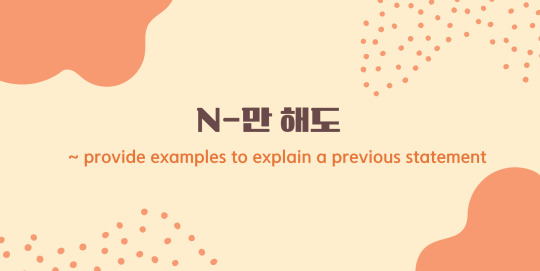
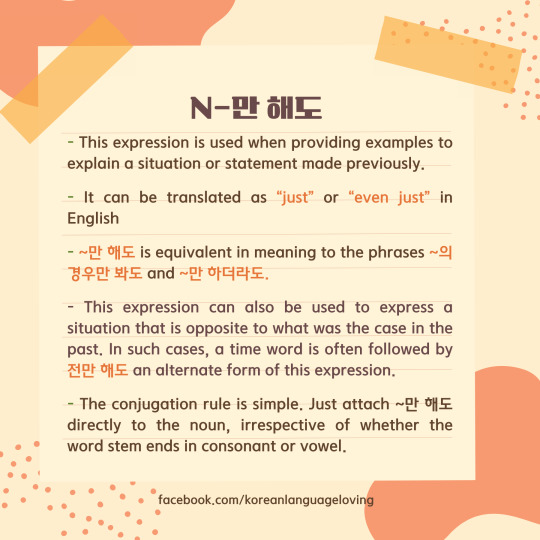
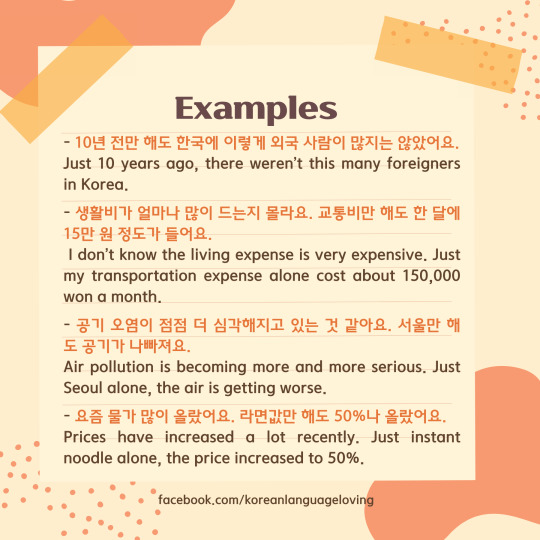
𝐊𝐨𝐫𝐞𝐚𝐧 𝐆𝐫𝐚𝐦𝐦𝐚𝐫: N-만 해도 ✏️𝐔𝐬𝐚𝐠𝐞 - 만 해도 is attached to a noun to explain an already-mentioned topic by giving a specific or representative example. - It can be translated as “just” or “even just” in English E.g. 민호 씨가 요즘 정말 열심히 공부하는 것 같아요. 어제만 해도 밤 10시까지 도서관에서 공부 하더라고요. (It looks like Minho is studying very hard recently. Just yesterday he studied until 10 pm at the library.) ✏️ 𝐒𝐩𝐞𝐜𝐢𝐚𝐥 𝐍𝐨𝐭𝐞 (1) ~만 해도 is equivalent in meaning to the phrases ~의 경우만 봐도 and ~만 하더라도. E.g. 식료품비만 해도 한 달에 30만 원 정도 들어요. = 식료품비만 하더라도 한 달에 30만 원 정도 들어요. = 식료품비의 경우만 봐도 한 달에 30만 원 정도 들어요 (Just for groceries alone, it costs about 300,000 won a month.) (2) This expression can also be used to express a situation that is opposite to what was the case in the past. In such cases, a time word is often followed by 전만 해도 an alternate form of this expression. E.g. 2년 전만 해도 한국어를 한마디도 할 줄 몰랐지만 이제는 한국 노래를 곧잘 부르게 됐다. (Just two years ago, I couldn't speak a word of Korean, but now I'm good at singing Korean songs) ✏️ 𝐂𝐨𝐧𝐣𝐮𝐠𝐚𝐭𝐢𝐨𝐧 Attach ~만 해도 directly to the noun, irrespective of whether the word stem ends in consonant or vowel. Noun + 만 해도: 오늘만 해도 = just today 어제만 해도 = just yesterday 친구만 해도 = even just my friends ✏️ 𝐌𝐨𝐫𝐞 𝐄𝐱𝐚𝐦𝐩𝐥𝐞𝐬 1. 인터넷 쇼핑몰을 이용하는 사람이 증가하고 있어요. - 네, 제 어머니만 해도 자주 인터넷에서 쇼핑을 하세요. (The number of people using Internet shopping malls is increasing. - Yes, even just my mother, she often shops online.) 2. 여행 방학에 유럽으로 배낭여행을 가는 학생들이 많다고 들었어요. - 네, 맞아요. 제 친구들만 해도 벌써 여러 명이 다녀왔어요. (I heard that many students travel to Europe during summer vacation. - Yes, that's right. Even just among my friends, many have done so.) 3. 즘에는 대학생들이 취업하기가 참 힘들다면서? - 응, 우리 오빠만 해도 대학을 졸업한 지 2년이 지났는데 아직 취업을 못 했어. (I heard it's hard for college students to get a job these days - Yes, just my brother alone, it's been two years since graduated from college, but he hasn't gotten a job yet.) 4. 연세가 많으신 분들도 요즘은 스마트폰을 잘 쓰시더라. - 맞아, 우리 할아버지만 해도 스마트폰으로 음악도 들으시 고 게임도 하셔. (Older people are also using smartphones well these days. That's right, even just my grandfather, he listens to music and plays games on his smartphone.) 5. 결혼을 늦게 하는 사람이 참 많아요. - 그러게요. 제 동생만 해도 올해로 서른 다섯인데 아직도 미혼이에요. (There are so many people who get married late. - I know. Even just my brother, he is 35 years old this year, but he's still single.) #Koreanlanguage #KoreanGramamr #LearnKorean #Studywithme
-
Kindly Visit My Blog Here
Available Products Here
Support me by buying Korean Writing Notebook Here
#Korean Grammar#Korean Language#Learn Korean#Study Korean#Study WITH mE#한국어 배우기#한국어능력시험#한국어 단어#한국어배우기#한국어#한국어문법#한국어 문법#한국어공부중#한국어공부해요#한국어공부하기#한국어공부#Hangul#한국어배우
32 notes
·
View notes
Photo
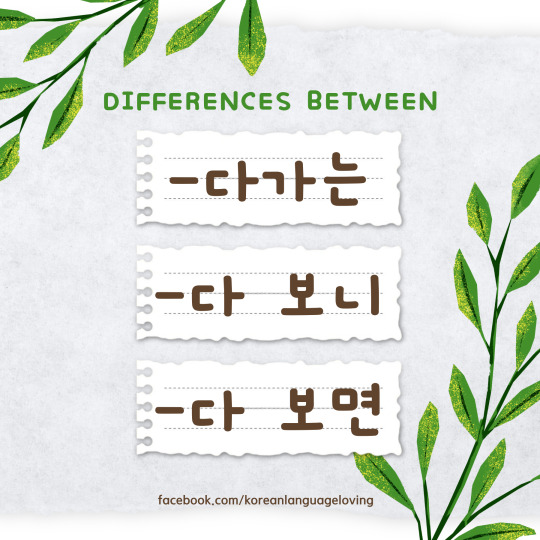
𝐃𝐢𝐟𝐟𝐞𝐫𝐞𝐧𝐜𝐞𝐬 𝐁𝐞𝐭𝐰𝐞𝐞𝐧 𝐆𝐫𝐚𝐦𝐦𝐚𝐫 -다 보니, -다 보면, 𝐚𝐧𝐝 -다가는 ✏️ 𝐒𝐢𝐦𝐢𝐥𝐚𝐫𝐢𝐭𝐢𝐞𝐬 -다 보니, -다 보면, and -다가는 all refers to a continuous action in the preceding clause. E.g. 매일 연습하다 보니… 매일 연습하다 보면… 매일 연습하다가는… (If you keep practicing every day…) - Future tense and past tense can't come before-다 보니, -다 보면, and -다가는. You simply have to add 다 보니, -다 보면, or -다가는after the verb stem E.g. 가다 (to go) -다 보니 → 가다 보니 -다 보면 → 가다 보면 -다가는 → 가다가는 ✏️ 𝐃𝐢𝐟𝐟𝐞𝐫𝐞𝐧𝐜𝐞𝐬: (𝟏) The result in the following clause: -다 보니: Positive or Negative result. -다 보니 indicates that while/after doing something repeatedly, the speaker realizes something new or comes to a new state. E.g. Positive result: 매일 열심히 공부하다 보니 한국어 실력이 늘게 됐어요. (As I kept studying hard every day, my Korean skills improved.) Negative result: 쉬지 않고 일하다 보니 몸에 큰 병이 생겼어요. (As I kept working without rest, I got a serious illness.) -다 보면: Positive or Negative result. -다 보면 indicates that if you keep doing an action or behavior, then something will (likely) occur. E.g. Positive result: 열심히 공부하다 보면 한국어 실력이 늘게 될 거예요. (If I study hard, my Korean skills will improve.) Negative result: 준비 운동 안 하고 달리기를 하다 보면 부상�� 거예요. (If you keep running without doing any warmup exercises, you will injure yourself.) -다가는: Negative result only. -다가는 indicates that if the action is continued, a negative outcome will occur. It is often used to warn a person. E.g. Negative result only: 그렇게 쉬지 않고 일하 다가는 몸에 큰 병이 생 길 거예요. (If you keep working without rest like that, you will get a serious illness.) (𝟐) The tense in the following clause: -다 보니: Past Tense or Present Tense (result already completed) because the speaker realizes the new thing or come to the new state already. E.g. 매일 늦게 자다 보니 습관 이 되었어요. (As I kept sleeping late every day, it became a habit). 매일 늦게 자다보니 일찍 일어나는 게 힘들어요. (As I keep sleeping late every day, it is hard to get up early). -다 보면: Present Tense (general result) or Future Tense (expected result) E.g. 외국에 살다 보면 고향 음식이 생각날 때가 많아요. (When I live abroad; I think of my hometown's food a lot.) 외국에 살다 보면 고향 음식이 생각날 때가 많을 거예요. (If I live abroad, I will think of my hometown's food a lot.) -다가는: Present Tense (general result) or Future Tense (expected result). Because this expression has a hypothetical meaning, the following clause tends to end in a phrase indicating supposition or conjecture. E.g. 자주 굶다가는 건강을 해치게 돼요. (If you keep skipping meals often, it damages your health.) 그렇게 자주 굶다가는 건강을 해치게 될 거예요. (If you keep skipping meals often like this, your health will be damaged.) #KoreanGrammar #Studywithme #LearnKorean
---
🌸 🌼 🌻
Support Me Here
#한국어 배우기#한국어공부중#한국어 연습#한국어#한국어능력시험#Korean Grammar#Korean Language#korean langblr#Learn Korean#Study Korean#한국어문법#한국어 문법#한국어공부#한국어 공부하기#한국어 공부#hangul
49 notes
·
View notes
Photo
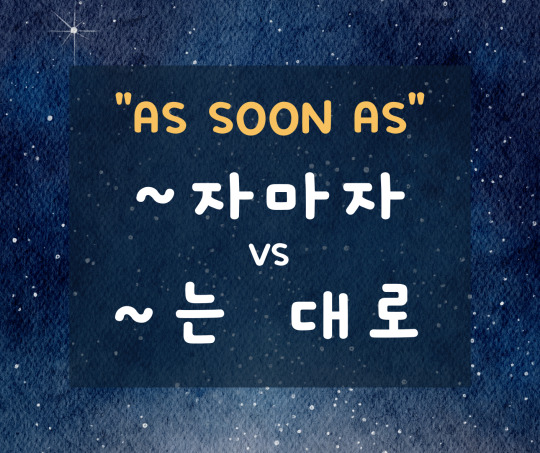
~자마자 vs ~는 대로 ~자마자 (jamaja) and ~는 대로 (neun dae-ro) are both grammatical structures in the Korean language that express simultaneity or "as soon as.". However, they are used in slightly different situations: ~자마자 (jamaja) is used to express the idea of "as soon as X happens, Y happens immediately after." It is used to indicate a very close sequence of events. ~는 대로 (neun dae-ro) is used to express the idea of "when X happens, Y happens." It is used to indicate a general sequence of events. It is worth to note that: (1) Before both ~자마자 and ~는 대로 are not conjugated to the past or future tenses. Rather, ~자마자 and ~는 대로 are attached directly to the verb and the tense can be assumed from the conjugation of the second clause. E.g. 집에 도착하는 대로 밥을 먹어야 돼요. = 집에 도착하자마자 밥을 먹어야 돼요. (As soon as I get home, I have to eat.) (2) ~자마자 is usually used with the past or present tense. While ~는 대로 is usually used with present or future tense. E.g. 도착하는 대로 집으로 전화했어요 (x) 도착하자마자 집으로 전화했어요 (o) (As soon as I arrived, I called home.) or 도착하는 대로 집에 전화할 거예요 (o) (As soon as I arrive, I will call home.) (3) ~자마자 can be used with random situations, i.e. two events that have nothing to do with each other but have continuity in time. While with ~는 대로, the events must be related or the events happen as planned. E.g. 소식이 오는 대로 알려드리겠습니다 = 소식이 오자마자 알려드리겠습니다 (As soon as I get the news, I'll let you know.) --> This is a sequence of events. Therefore, it can be used with both 자마자 and 는 대로 식사를 시잣하는 대로 전화가 왔다 (x) 식사를 시잣하자마자 전화가 왔다 (o) (As soon as I had dinner, I got a call) --> The two events - "had dinner" and "got a call" are not related to each other. Therefore, you cannot use grammar ~는 대로 (4) Do not use 는 대로 with events/ actions that happen by chance or by accident. E.g. 출발하는 대로 눈이 내리기 시작 했어요. (x) 출발하자마자 눈이 내리기 시작 했어요. (o) (As soon as we left, it started snowing) --> The snowing is an unexpected event which is not depended on whether we left or not. Therefore, you cannot use grammar ~는 대로. Note: Overall, ~자마자 seems to be much more common than ~는 대로 in daily conversations, and ~자마자 can replace ~는 대로 in most situations. However, it's important to keep in mind that the usage of these grammars may vary depending on the context and the level of formality of the situation, and there may be some exceptions to this general rule.
🌸 🌼 🌻
Support me at: https://koreanlanguageloving.my.canva.site/
#Korean Grammar#Korean Vocabulary#Learn Korean#Study Korean#Hangul#Koreang Language#korean langblr#한국어문법#한국어 문법#한국어 배우기#한국어 단어#한국어능력시험#한국어 공부하기#한국어공부중#한국어배우기#한국어
31 notes
·
View notes
Photo
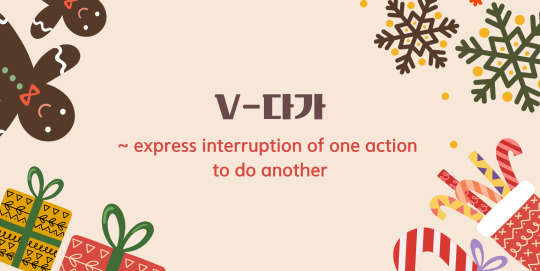
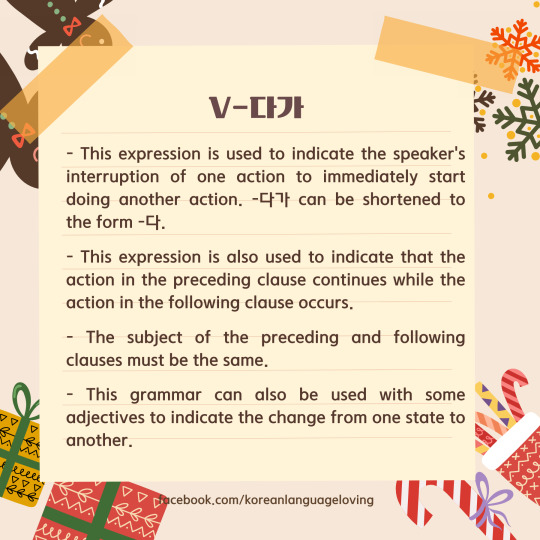
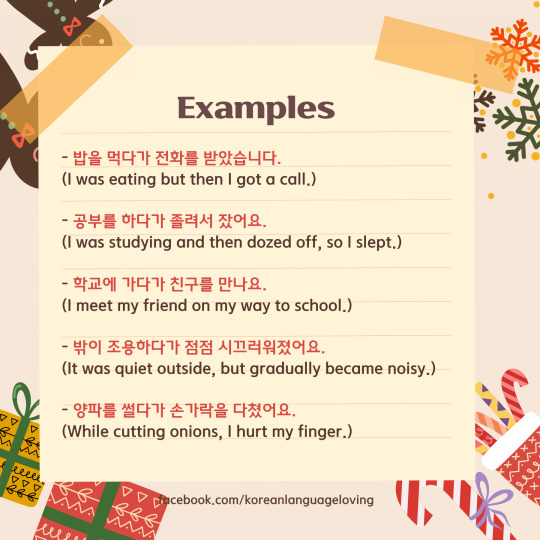
𝐊𝐨𝐫𝐞𝐚𝐧 𝐆𝐫𝐚𝐦𝐦𝐚𝐫: Verb + 다가 ✏️𝐔𝐬𝐚𝐠𝐞 - This expression is used to indicate the speaker's interruption of one action to immediately start doing another action. -다가 can be shortened to the form -다. E.g. 축구를 하다가 넘어져서 다쳤어요. (I was playing soccer and then I felt and got hurt.) ✏️ 𝐒𝐩𝐞𝐜𝐢𝐚𝐥 𝐍𝐨𝐭𝐞 (1) This expression is also used to indicate that the action in the preceding clause continues while the action in the following clause occurs. E.g. 잠을 자다가 꿈을 꾸었어요. (I had a dream while sleeping.) (2) The subject of the preceding and following clauses must be the same. E.g. (내가) 밥을 먹다가 전화가 왔습니다. (X) ᅳ> (내가) 밥을 먹다가 (내가) 전화를 받았습니다. (〇) The sentence is ungrammatical because the subject of 전화가 왔습니다 is 전화. Therefore, the subject is different. (3) This grammar can also be used with some adjectives to indicate the change from one state to another. E.g. 날씨가 맑다가 갑자기 흐려졌어요. (It was sunny and suddenly became cloudy.) ✏️ 𝐂𝐨𝐧𝐣𝐮𝐠𝐚𝐭𝐢𝐨𝐧 After removing 다 from the root verb, add ~다가 after the verb stem irrespective of whether the verb stem ends with a consonant or vowel. 먹다 → 먹다가 (I was eating and then...) 일하다 → 일다가 (I was working and then...) ✏️ 𝐃𝐢𝐟𝐟𝐞𝐫𝐞𝐧𝐜𝐞 𝐛𝐞𝐭𝐰𝐞𝐞𝐧 -다가 𝐚𝐧𝐝 -면서, -고 -다가 expresses the interruption of one action to do another action. -면서 expresses that two actions are happening at the same time -고 express the time order (the first action happens and then the second action) E.g. 공부하다가 음악을 들어요. → In the middle of studying, he listened to music. (the action of studying hasn’t finished) 공부하면서 음악을 들었어요. → While studying, he listened to music (the action of studying and listening to music happened at the same time) 공부하고 음악을 들어요. → He studied and then listened to music (the action of studying has finished.) ✏️ 𝐌𝐨𝐫𝐞 𝐄𝐱𝐚𝐦𝐩𝐥𝐞𝐬 1. 아까 낮에 뭐 했니? - 만화책을 읽다가 친구하고 같이 외출했어. (What did you do this afternoon? - I was reading a comic book, but then I went out with a friend.) 2. 어디에 다녀오세요? - 요리를 하다가 파가 없어서 사 왔어요. (Where are you going? - I was cooking, but then there was no onion, so I went out to buy some.) 3. 길을 걸어가다가 갑자기 생각이 나서 전화했어. (I was walking down the street and suddenly thought (of you), so I called.) 4. 중국어를 배우다가 너무 어려워서 포기했어요. (While learning Chinese, I gave up because it was too difficult.) 5. 설거지를 하다가 접시를 깨뜨렸어요. (While doing dishes, I broke the plate.) #한국어문법 #KoreanGrammar #LearnKorean #Studywithme -
Kindly Visit My Blog Here
Available Products Here
Support me by buying Korean Writing Notebook Here
#한국어문법#한국어 배우기#한국어배우기#한국어능력시험#한국어 문법#한국어#studying Korean#learn korean#study hard#hangul#Korean Language#korean grammar in use#Korean Grammar Rules#korean grammar
30 notes
·
View notes
Photo

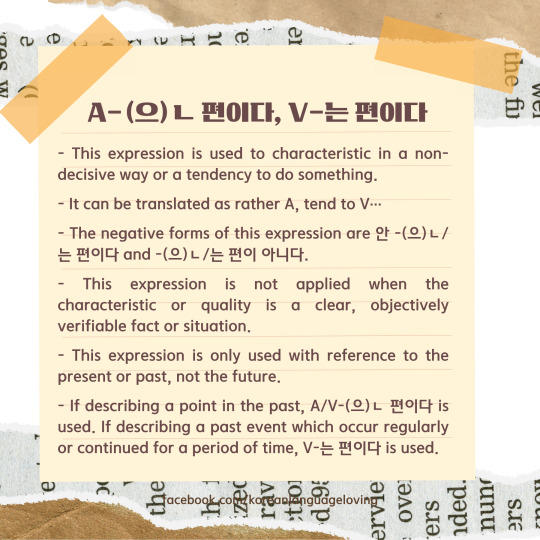
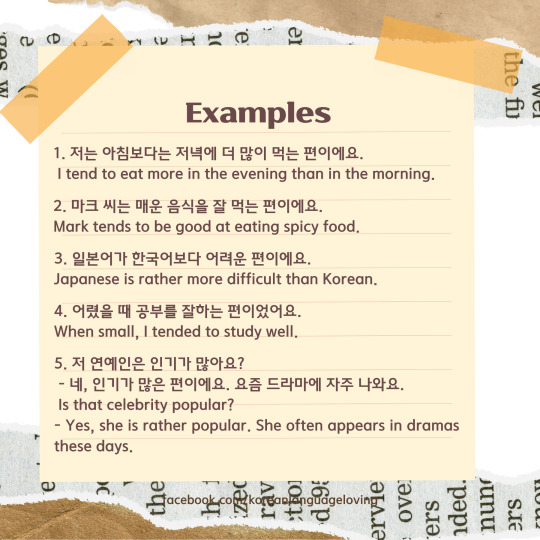
𝐊𝐨𝐫𝐞𝐚𝐧 𝐆𝐫𝐚𝐦𝐦𝐚𝐫: A-(으)ㄴ 편이다, V-는 편이다 ✏️ 𝐔𝐬𝐚𝐠𝐞 - "편" can be a regular noun meaning "side." It is often paired with a word indicating a direction to specify which side, such as 왼편 (the left side), or 오른편 (the right side). This expression, therefore, can be translated literally as “on the … side”. It is used to describe a quality or attribute in a non-definite or ambiguous way. It indicates that the thing being described has more of one particular characteristic than another or is closer in similarity to one characteristic than to another. It makes the sentence sounds more humble and softer. - It can be translated as rather A, tend to V (than usual), … E.g. 제가 벌고 있는 급여가 높은 편이에요. (The salary I'm earning is high.) → This sentence sounds a bit straightforward. 제가 벌고 있는 급여가 높은 편이에요. (The salary I’m earning is rather high.) → 편 makes the meaning slightly softer and more humble ✏️ 𝐒𝐩𝐞𝐜𝐢𝐚𝐥 𝐍𝐨𝐭𝐞𝐬 (1) When a verb precedes this expression, it's usually necessary to include an adverb that modifies the verb. E.g. 제가 운동을 하는 편이에요 (I tend to exercise) → Not really make sense → 제가 운동을 열심히 하는 편이에요 (I tend to exercise a lot) (2) The negative forms of this expression are 안 -(으)ㄴ/는 편이다 and -(으)ㄴ/는 편이 아니다. E.g. 저는 많이 안 먹는 편이에요. = 저는 많이 먹는 편이 아니에요. (I tend to not eat a lot) (3) This expression is not applied when the characteristic or quality is a clear, objectively verifiable fact or situation. E.g. 내 동생은 키가 185cm인 편이에요. (X) → 내 동생은 키가 185cm예요. (O) (My brother is 185cm tall) 저는 학생이 아닌 편이에요. (X) → 저는 학생이 아니에요. (O) (I'm not a student) (4) This expression is only used with reference to the present or past, not the future. 저는 쇼핑을 자주 하는 편일 거예요/편이겠어요. (X) → 저는 쇼핑을 자주 하는 편이었어요. (O) 저는 쇼핑을 자주 하는 편이에요. (O) (I tend to go shopping often.) *Note: - When describing a particular moment in the past, A/V-(으)ㄴ 편이다 is used. This form conveys the idea that the characteristic or quality was present at a specific point in the past. E.g. 오늘은 다른 때보다 일찍 일어난 편이야. (I tend to wake up early than usual today.) In this sentence, we must use -(으)ㄴ 편이다 because 오늘 is a specific time. - When describing a past event that occurred repeatedly or continued over a period of time, V-는 편이다 is used. This form emphasizes the continuity and repetition of the event and the stability of the characteristic or quality throughout the event. E.g. 옛날에는 고기를 자주 먹는 편이었어요. (In the past, I tended to eat meat often.) In this sentence, although '어렸을 때' identifies a time in the past, -는 편이었다 must be used because it is used to express repeated events or habits in the past. (5) When a verb precedes this expression, the form will be changed to 인 편이다 E.g. 저는 좀 내성적인 편이에요. (I'm kind of introverted.) ✏️ 𝐂𝐨𝐧𝐣𝐮𝐠𝐚𝐭𝐢𝐨𝐧 - Adjective + -(으)ㄴ 편이다 = rather A 피곤하다 → 피곤한 편이다 크다 → 큰 편이다 - Present + Repeated Past: Verb + -는 편이다 = tend to V 먹다 → 먹는 편이다 잘하다 → 잘하는 편이다 - Past: Verb + -ㄴ/은 편이다 = tend to V 먹다 → 먹은 편이다 일어나다 → 일어난 편이다 ✏️ 𝐌𝐨𝐫𝐞 𝐄𝐱𝐚𝐦𝐩𝐥𝐞𝐬 1. 안나 씨가 남자 친구는 체격이 어때요? - 제 남자친구는 키가 크고 조금 통통한 편이에요. (Anna, what does your boyfriend look like? - My boyfriend is rather tall and a little chubby.) 2. 수지 씨 회사 사람들은 회식을 자주 해요? - 네, 일주일에 한 번씩은 하니까 자주 하는 편이지요. (Suzy, do your company people eat out often? - Yes, since we eat out once a week, so we tend to do that often.) 3. 앤디 씨가 같은 반 친구들에 비해서 한국말을 더 잘하는 것 같아요. - 맞아요. 앤디 씨는 한국 친구들이 많아서 그런지 다른 외국 학생들보다 한국말을 잘하는 편인 것 같아요. (I think Andy speaks Korean better than his classmates. - You're right. I think it is because he has a lot of Korean friends, but it seems his Korean is rather better than most of the other foreign students.) 4. 이 ���당은 깨끗하고 음식 맛도 좋아서 손님이 많이 오는 편이에요. (Due to its cleanliness and delicious food, this restaurant tends to attract a lot of customers) 5. 이 영화는 이번 달에 개봉한 다른 영화들보다 재미있는 편이에요. (This movie is rather more interesting than other movies that were released this month.) #KoreanGrammar #KoreanLanguage #Studywithme
🌸 🌼 🌻
Support me at: https://koreanlanguageloving.my.canva.site/
#Korean Grammar#Korean Language#korean langblr#Korean Study#Learn Korean#Study with me#한국어공부중#한국어공부해요#한국어 공부하기#한국어공부#한국어#한국어 배우기#한국어배우#한국어수업#한국어 단어#한국어문법#한국어 문법
20 notes
·
View notes
Photo

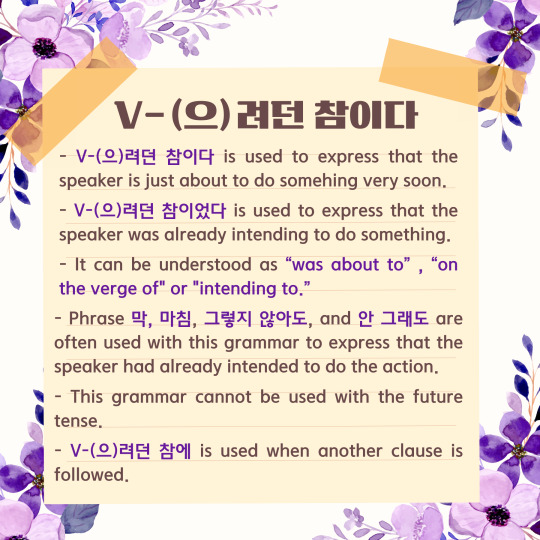
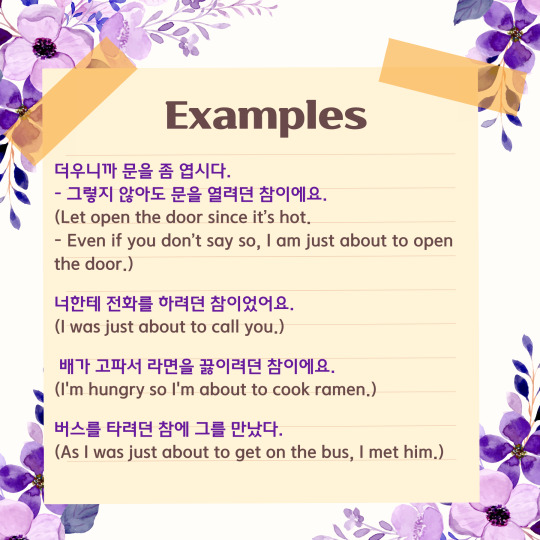
𝐊𝐨𝐫𝐞𝐚𝐧 𝐆𝐫𝐚𝐦𝐦𝐚𝐫: V-(으)려던 참이다 ✏️𝐔𝐬𝐚𝐠𝐞 - This expression is used to express the fact that not only had the speaker been intending to do the very thing the other person is suggesting, but he or she was either just about to do it at the very moment or intended to do so very soon. This grammar can only be used with verbs. E.g. A: 저는 점심을 먹으러 갈 거예요. 같이 갈까요? B: 잘 됐네요. 저도 점심 먹으려던 참이었어요. 같이 가요. (A: I'm going to go eat lunch. Do you want to go together? B: It's great. I was about to have lunch, too. Let's go together.) - V(으)려던 참이다 and V(으)려던 참이었다 are two forms of this grammar. There are differences between the two: • V(으)려던 참이다 indicates that the speaker was just about to do the action at the very minute. It is equal to "be just about to do”, or “on the verge of doing something" in English. • V(으)려던 참이었다 indicates that the speaker had already been intending to do the action. It is equal to "have already been planning to do" or "was just about to do" in English. E.g. 저도 점심 먹으려던 참이에요. → the speaker was just about to have lunch at that very moment. 저도 점심 먹으려던 참이었어요. → the speaker had been planning to have lunch before the time of the conversation. ✏️ 𝐒𝐩𝐞𝐜𝐢𝐚𝐥 𝐍𝐨𝐭𝐞 - Phrases such as 막 (just at the moment), 마침 (just in time), 그렇지 않아도 (even without you saying that), and 안 그래도 (even if it's not like that) are often used when responding to someone who has suggested doing something that the speaker had already intended to do. E.g. A: 저 영화가 재미있다고 하는데 저 영화를 볼래요? B: 좋아요. 그렇지 않아도 나도 보려던 참이었어요. (A: I heard the movie is interesting. Do you want to see it? B: Sounds good. Even if you hadn't asked, I had been planning to see it anyway.) - This grammar cannot be used with the future tense. - V-(으)려던 참에 is used when another clause is followed. E.g. 내가 전화를 하려던 참에 어머니가 전화를 하셨어요. (When I was about to make a phone call to my mother, I got a call from her.) ✏️ 𝐂𝐨𝐧𝐣𝐮𝐠𝐚𝐭𝐢𝐨𝐧 - When the verb stem ends with a consonant, add 으려던 참이다 after removing 다 from the root verb. - When the verb stem ends with a vowel, add 려던 참이다 after removing 다 from the root verb. E.g. 가다 -> 가려던 참이다 (be just about to go) 먹더 -> 먹으려던 참이다 (be just about to eat)
✏️ 𝐌𝐨𝐫𝐞 𝐄𝐱𝐚𝐦𝐩𝐥𝐞𝐬
1. A: 지금 뭐 해요?
B: 얼굴을 세수하고 잠을 자려던 참이었어요.
(A: What are you doing now?
B: I was about to wash my face and go to sleep.)
2. A: 시간이 없으니까 좀 서두릅시다.
B: 그렇지 않아도 지금 나가려던 참이에요.
(A: I don’t have time, so let’s hurry.
B: Even if you don’t say so, I am just about to leave now.)
3. A: 한국 요리를 배우려고 하는데 같이 배울까요?
B: 좋아요. 저도 한국 요리를 배워 보려던 참였어요.
(A: I am planning to learn Korean cuisine. Shall we learn together?
B: It’s great. I was also thinking about learning it.)
❤️
Kindly Visit My Blog Here
Available Products Here
Available Korean Writing Notebook Here
#한국어공부중#한국어공부해요#한국어공부하기#한국어공부#한국어#한국어 배우기#한국어능력시험#한국어 단어#한국어문법#Korean Grammar#Korean Language#Korean Hangul#Hangul#Learn Korean#Study Korean
41 notes
·
View notes
Photo

바람이 불지 않을 때 바람개비를 돌리는 방법은 앞으로 달려나가는 것이다 When the wind is not blowing, the way to spin the pinwheel is to run forward. ✏️ 𝐕𝐨𝐜𝐚𝐛𝐮𝐥𝐚𝐫𝐲: 1. 바람 (n): wind 2. 불다 (v): blow 3. 바람개비 (n): pinwheel 4. 돌리다 (v): turn, spin 5. 방법 (n): way, method 6. 앞 (n): front 7. 달려나가다 (v): run [rush] out, ✏️ 𝐆𝐫𝐚𝐦𝐦𝐚𝐫: 1. A/V + 지 않다: Negation = not, is not, do not e.g. 바람이 불지 않다 = The wind does not blow = no wind 2. V + 을/ㄹ 때: Express time = when, during e.g. 바람이 불지 않을 때 = When the wind is not blowing 3. V + 는 + N: Noun modifier = N that V e.g 바람개비를 돌리는 방법 = The way to spin the pinwheel 4. N + (으)로: Indicate the direction of a movement = Towards, to e.g. 앞으로 달려나가다 = run forward 5. V + 는 것이다: Describing Nouns with Verbs = V-ing, the action of V e.g. 앞으로 달려나가는 것이다 = the action of running forward
--
Kindly Visit My Blog Here
Available Products Here
Available Korean Writing Notebook Here
#korean langblr#korean quotes#motivational quotes#korean language#korean phrases#learn korean#study korean#한국어공부해요#한국어공부중#한국어공부하기#한국어 공부하기#한국어공부#한국어 단어#한국어 배우기#한국어능력시험#한국어 연습#한국어배우기#한국어문법
29 notes
·
View notes
Photo

이 세상에는 열심히 노력한다고 해서 꼭 성공할 수 있는 것은 아니지만 노력하지 않으면 성공할 기회조차 없습니다 (In this world, trying hard doesn't necessarily mean you can succeed But if you don't try, you don't even have a chance to succeed) ✏️ 𝐕𝐨𝐜𝐚𝐛𝐮𝐥𝐚𝐫𝐲: 1. 세상 (Noun): world 2. 열심히 (Adverb): hard, diligently 3. 노력하다 (Verb): make effort, endeavor, work hard 4. 꼭 (Adverb): firmly, tightly 5. 성공하다 (Verb): succeed 6. 기회 (Noun): chance, opportunity ✏️ 𝐆𝐫𝐚𝐦𝐦𝐚𝐫: 1. V ~ㄴ/는다고 하다 = said ~citing one's statement 2. A/V~아/어(서) = because (of)/ so that… ~ indicating reasons and causes 3. V~(으)ㄹ수있다 = can ~ expressing ability and possibility 4. A/V~지만 = but/ even though ~ expressing opposing situations 5. A/V~(으)면 = if, when ~expressing a supposition or a condition about a fact 6. A/V~을/ㄹ N grammar = N that A/V ~noun modifier in future tense 7. N-조차 = (not) even N~ “not only the others but also the primary one”
-
Kindly Visit My Blog Here
Available Products Here
Available Korean Writing Notebook Here
#Korean Quotes#Korean Language#Korean Phrases#quotes of tumblr#한국어공부해요#한국어 공부하기#한국어공부중#한국어공부#한국어문법#한국어 단어#한국어 배우기#한국어배우기#한국어능력시험#한국어#hangul
22 notes
·
View notes
Photo

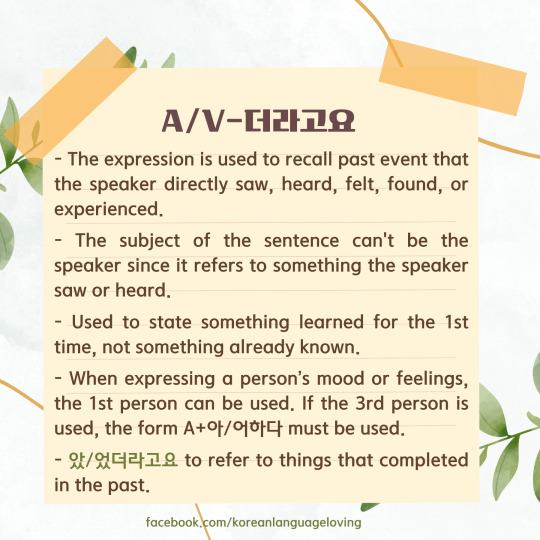
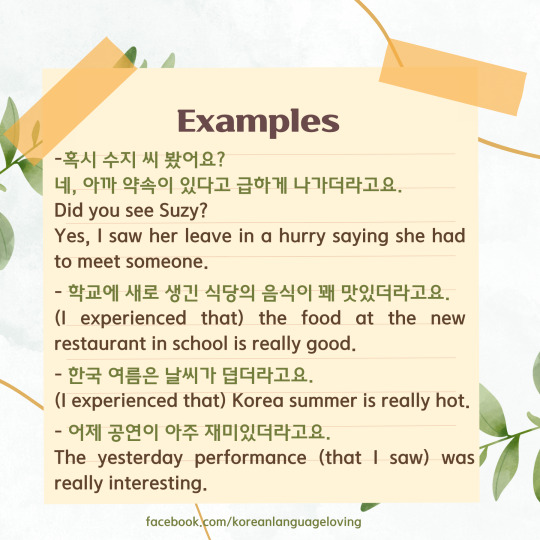
𝐊𝐨𝐫𝐞𝐚𝐧 𝐆𝐫𝐚𝐦𝐦𝐚𝐫: A/V-더라고요 ✏️𝐔𝐬𝐚𝐠𝐞 - This grammar is used to recall past event that the speaker directly saw, heard, or felt when noticing or discovering something new. - It is equivalent to “I saw that”, “I observed that” or “I experienced that” in English. E.g. 뉴스에서 춥다고 했는데 별로 춥지 않더라고요. (The news said it was cold, but (I experienced that) it wasn't that cold.) ✏️ 𝐒𝐩𝐞𝐜𝐢𝐚𝐥 𝐍𝐨𝐭𝐞 (1) Because this expression refers to something the speaker directly experienced, the subject of the sentence cannot be the speaker. In other words, the sentence cannot be in the first person. E.g. 나는 해외로 여행을 가더라고요 (X). → You can’t use this when you are talking about yourself. It doesn’t make sense to say that you saw yourself going on an overseas holiday. → 나는 해외로 여행을 갔어요 (O) (I went on an overseas holiday.) (2) This expression is only used to state something the speaker learned for the first time, not something already known. E.g. 제 고향은 강이 많더라고요 (X) →제 고향은 강이 많아요 (O) (My hometown has a lot of rivers.) (3) This grammar can be used in first person when expressing the person's mood, emotions, or feelings. When the third person is used, the form A+아/어하다 (turn an adjective into a verb) must be used. E.g. First person: 비가 오면 동생은 우울하더라고요. (X) ; —> 비가 오면 (저는) 우울하더라고요. (〇) (I got depressed when it rains.) Third person: 그 이야기를 듣고 어머니가 속상하시 더라고요. (X) ᅳ> 그 이야기를 듣고 어머니가 속상해하시더라고요. (〇) (My mom was upset when she heard that story.) (4) -더라고(요) is roughly equivalent in meaning to -더군(요) and -더라. However, the expression -더라고(요) carries a slightly strong sense of emphasize. In addition, -더군(요) can be used in both honorific and casual speech while -더라 can only be used in casual speech. E.g. 남자 친구를 사귀다 보니까 가끔은 속상한 일도 생기더라고요. = 남자 친구를 사귀다 보니까 가끔은 속상한 일도 생기더군요. = 남자 친구를 사귀다 보니까 가끔은 속상한 일도 생기더라. (When I dated with my boyfriend, sometimes upset things happened.) (5) To refer to things that completed in the past (it had happened), -았/었더라고요 is used. E.g. 일본에 도착하니까 비가 오더라고요. (It was raining when I arrived In Japan.) → Refer that the speaker did witnessed the rain was falling. 일본에 도착하니까 비가 왔더라고요. (It had rained when I arrived in Japan.) → Refer that the speaker didn’t personally see the rain was falling, it had stopped at the time of being observed by the speaker. However, the speaker can still tell that there was rain based on some clues such as wet roads or humid air. ✏️ 𝐂𝐨𝐧𝐣𝐮𝐠𝐚𝐭𝐢𝐨𝐧 You simply have to add "-더라고요" after the verb stem irrespective of whether the verb stem ends with a consonant or vowel. Adjective/Verb + -더라고요 덥다 -> 덥더라고요 (I experienced that the weather is hot) 맛있다 -> 맛있더라고요 (I found that the food is tasty) 가다 -> 가더라고요 (I saw he went away) 들어오다 -> 들어오더라고요 (I saw she came in) ✏️ 𝐌𝐨𝐫𝐞 𝐄𝐱𝐚𝐦𝐩𝐥𝐞𝐬 1. A: 늦어서 죄송합니다. B: 괜찮아요. 오늘은 길이 정말 많이 막히더라고요. (A: I'm sorry I'm late. B: It's okay. (I saw that) there was a lot of traffic today.) 2. 소연 씨 남자 친구를 봤는데 키가 크더라고요. (I saw Soyeon's boyfriend and he was tall.) 3. 내가 금요일에 마지막 수업을 끝냈을때 옆 반에 수업이 벌써 끝났더라고요. (When I finished my last class on Friday, (I saw that) the class next to me had already finished.) 4. 그 사람은 무서워보이지만 진짜 착하더라고요. (He looks scary, but (I experienced that) he's really nice) 5. 어제 친구들이랑 같이 축구를 했는데 앤디 씨가 정말 잘하더라고요. I played football with my friends yesterday, and (I witnessed that) Andy plays really well.
-
Kindly Visit My Blog Here
Available Products Here
Available Korean Writing Notebook Here
#Korean Language#Korean Grammar#Learn Korean#Study Korean#korean studyblr#한국어공부중#한국어공부해요#한국어공부#한국어공부하기#한국어 공부하기#한국어배우기#한국어배우#한국어문법
25 notes
·
View notes
Photo
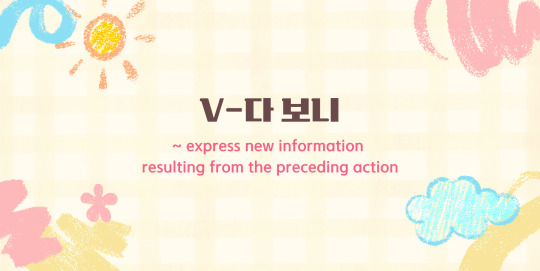
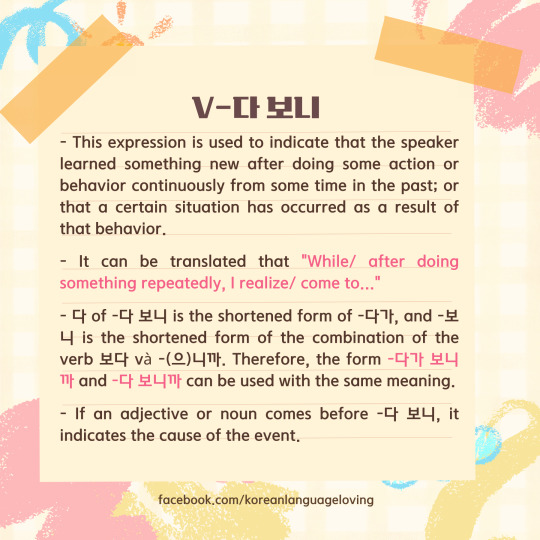
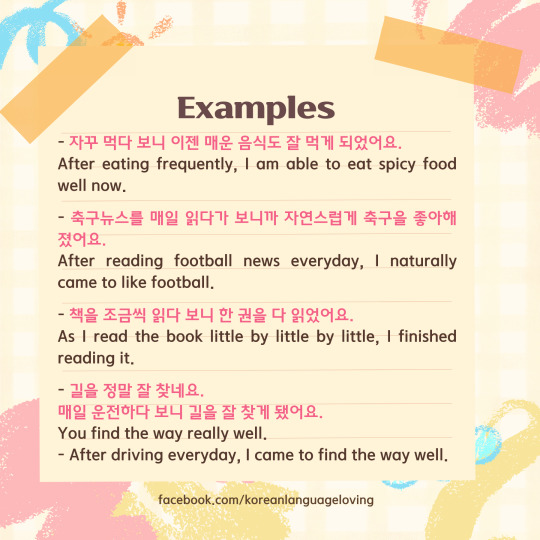
𝐊𝐨𝐫𝐞𝐚𝐧 𝐆𝐫𝐚𝐦𝐦𝐚𝐫: V-다 보니 ✏️𝐔𝐬𝐚𝐠𝐞 This expression is used to indicate that the speaker learned something new after doing some action or behavior continuously from some time in the past, or that a certain situation has occurred as a result of that behavior. E.g. 한국에 와서 김치를 먹다 보니 이제는 김치 없으면 밥을 못 먹어요. (After eating kimchi frequently in Korea, I can't eat rice without kimchi now.) ✏️ 𝐒𝐩𝐞𝐜𝐢𝐚𝐥 𝐍𝐨𝐭𝐞 (1) 다 of -다 보니 is the shortened form of -다가, which refers to something occurring in the middle of a continuous action, and -보니 is the shortened form of the combination of the verb 보다 và -(으)니까, which refers to a discovery or result. Therefore, the form -다가 보니까 and -다 보니까 can be used with the same meaning. E.g. 일하다 보니 어느새 오후 7시가 넘었더라고요. = 일하다가 보니까 어느새 오후 7시가 넘었더라고요. = 일하다 보니까 어느새 오후 7시가 넘었더라고요. (While I keep working, I just realize that it was over 7pm.) (2) When adjective or 이다 comes before -다 보니, the preceding clause indicates the reason or cause of the event or action in the following clause. E.g. Noun + 이다: 대통령은 한 나라의 대표이다 보니 경호하는 사람들이 많을 수밖에 없어요. (Since the president is the representative of a country, it is unavoidable that he or she will be heavily guarded by many people.) Adjective: 그 일이 워낙 중요하다 보니 혼자 결정할 수 없었어요. (Because it was in fact an important matter, I couldn't decide by myself.) (3) The grammar -다 보니 can be combined with the grammar -게 되다 or - 아/어지다 to express that after doing something repeatedly/continuously, you become or in a certain state as the result. E.g. - V-다 보니 V- 게 되다 저는 열심히 공부하다 보니 한국어를 잘하게 됐어요. (I studied hard and ended up being able to speak Korean well) - V-다 보니 Adj - 아/어지다 매일 공원에서 운동하다 보니 건강해졌어요. (As I worked out at the park every day, my health was gotten better.) (4) -다 보니 is that it is used to indicate repeated and continuing behaviors, hence, it is often used with adverbs of repetition such as 계속 (continuously), 꾸준히 (steadily), 항상 (always), 자주 (often), 매일 (every day)… (5) Please note that as the result was already completed, the following clause must be in past or present tenses. ✏️ 𝐂𝐨𝐧𝐣𝐮𝐠𝐚𝐭𝐢𝐨𝐧 Attach -다 보니to the root of a verb in the present tense. Verb + -다 보니: 가다 → 가다 보니 먹다→ 먹다 보니 살다 → 살다 보니 ✏️ 𝐌𝐨𝐫𝐞 𝐄𝐱𝐚𝐦𝐩𝐥𝐞𝐬 1. 집이 엉망이구나. - 혼자 살다 보니 집 정리를 잘 안 하게 돼요. (This house is a mess. - While living alone, I can't clean up often.) 2. 민아 씨는 지성 씨를 싫어하지 않았어요? - 처음엔 싫어했는데 매일 같이 일하다 보니 앤디 씨의 좋은 점이 보이더라고요. (Mina, don't you dislike Jisung? - I didn't like him at first, but after working with him together every day, I have come to see his good points.) 3. 마라톤이 힘들지 않아요? - 힘들지만 계속 달리다 보니 적응이 되었어요. (Isn't it hard to run a marathon? - It's hard, but because I kept running, I got used to it.) 4. 왜 직장을 그만뒀어요? - 너무 오래 같은 일을 하다 보니 지겨워져서 다른 일을 해 보려고요. (Why did you quit your job? I've been doing the same thing for so long that I'm tired of it, so I'm going to try something else.) 5. 경제 신문을 매일 읽다 보니 자연스럽게 경제에 대해 잘 알게 되었어요. (As I read the economics newspaper every day, I naturally got to know about the economy well.)
---
🌸 🌼 🌻
Support Me Here
#한국어#한국어능력시험#한국어 배우기#한국어 어휘#한국어 연습#Korean Language#Korean Grammar#한국어공부#한국어공부중#한국어공부해요#한국어공부하기#한국어문법#한국어 문법#Cause and Effect
15 notes
·
View notes
Photo
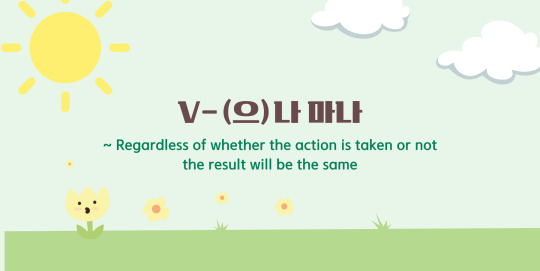
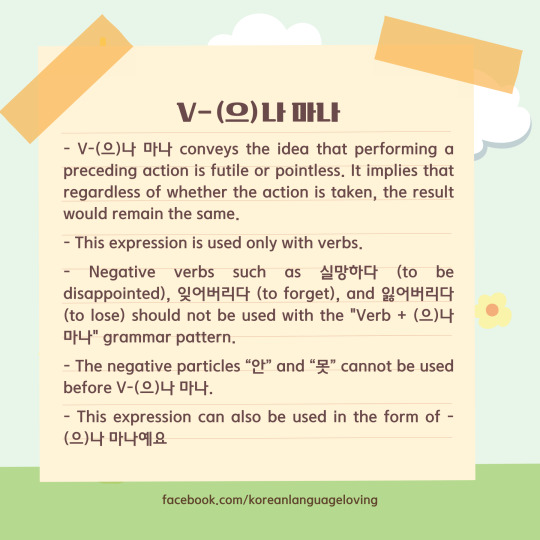
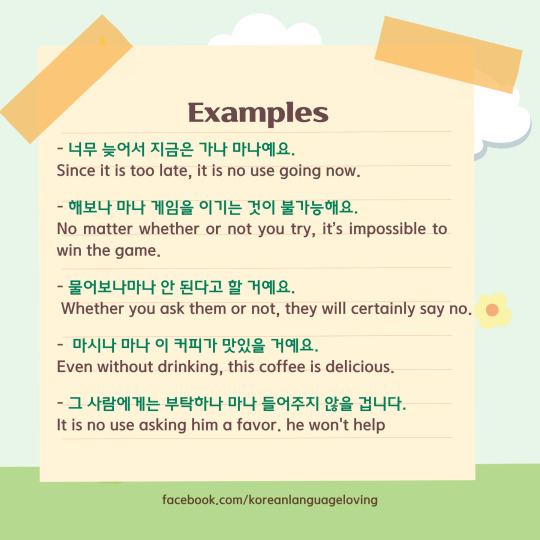
𝐊𝐨𝐫𝐞𝐚𝐧 𝐆𝐫𝐚𝐦𝐦𝐚𝐫: V-(으)나 마나 ✏️ 𝐔𝐬𝐚𝐠𝐞 - V-(으)나 마나expression conveys the idea that performing a preceding action is futile or pointless. It implies that regardless of whether the action is taken, the result would remain the same. It denotes a strong and decisive supposition that the result will not be altered by any preceding action. It is typically based on general common-sense knowledge or an understanding of someone's habitual actions. This expression is used only with verbs. - I can be translated as “be no use doing something” or “whether or not you do something” … E.g. 공부하나마나 시험 결과는 똑같을걸요. (The test results will be the same whether you study or not.) Express the idea that studying or not studying won't make a difference to the outcome of the test. ✏️ 𝐒𝐩𝐞𝐜𝐢𝐚𝐥 𝐍𝐨𝐭𝐞𝐬 (1) Negative verbs such as 실망하다 (to be disappointed), 잊어버리다 (to forget), and 잃어버리다 (to lose) cannot be used with the "Verb + (으)나 마나" grammar pattern. E.g. 실망하나 마나 그 사람을 안 만날 가예요. (X) 잊어버리나 마나 그 사람 이름을 기억 못 해요. (X) (2) The negative particles “안” and “못” cannot be used before V-(으)나 마나. E.g. 안 먹으나 마나 배가 고프기는 마찬가지일 거예요. (X) ᅳ> 먹으나 마나 배가 고프기는 마찬가지일 거예요. (O) (Whether you eat or not, you'll still be hungry) (3) This expression can also be used in the form of -(으)나 마나예요 E.g. 너무 늦어서 지금은 가나 마나예요 (It's too late now, whether we go or not.) ✏️ 𝐌𝐨𝐫𝐞 𝐄𝐱𝐚𝐦𝐩𝐥𝐞𝐬 1. 집에 가는 길에 세차를 좀 하려고 해요. - 저녁에 비가 올 거래요. 비가 오면 세차를 하나 마나니까 나중에 하세요. I am going to wash my car on the way home. - It will rain in the evening. It is no use washing your car, so do it later. 2. 식사하고 30분 후에 약을 먹어야 하는데 잊어버리고 안 먹었네요. - 약을 시간에 맞춰서 먹지 않으면 먹으나 마나예요. 그러니까 꼭 시간을 지켜서 드세요. I am supposed to take my medicine 30 minutes after eating, but I forgot about it. - If you didn't take medicine at right time, It is no use taking medicine. So you must take it at the right time. 3. 이 시간에는 가 보나 마나 가게 문을 닫았을 텐데요. At this time, the shop would close the door, so it's no use even going. 4. 이야기를 하나마나 하나도 달라지는 게 없어요. No matter whether you talk to him or not, nothing changes. 5. 경주에게 말해보나 마나 안 간다고 할 거야 There is no point asking Kyungju; she’ll say she won’t go. #KoreanGrammar #KoreanLanguage #studywithme
🌸 🌼 🌻
Support me at: https://koreanlanguageloving.my.canva.site/
#Korean Grammar#Korean Language#korean langblr#Hangul#Learn Korean#Study Korean#한국어 문법#한국어문법#한국어 배우기#한국어능력시험#한국어 단어#한국어배우기#한국어#한국어 공부하기#한국어공부중#한국어공부#한국어수업
18 notes
·
View notes
Photo
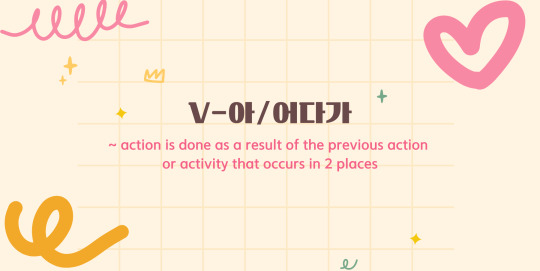
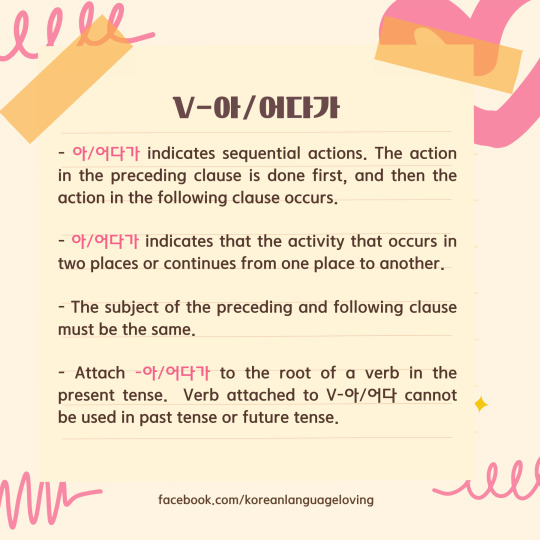
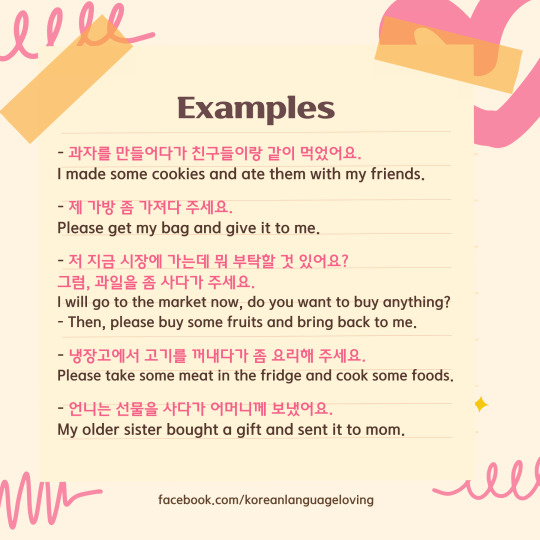
𝐊𝐨𝐫𝐞𝐚𝐧 𝐆𝐫𝐚𝐦𝐦𝐚𝐫: V-아/어다가 ✏️𝐔𝐬𝐚𝐠𝐞 This expression indicates that the action in the following clause is done based on the result of first completing the action in the preceding clause. Moreover, it also indicates that the speaker performed the second action in a different location than that of the first action. The shortened form V-아/어다 can also be used. E.g. 어제 시장에서 만두를 사다가 먹었습니다. (Yesterday I bought dumplings at the market and then ate them.) → Since V-아/어다 is used, the listener understands that the place where the dumplings were bought and the place where they were eaten is different even if they are not mentioned. ✏️ 𝐒𝐩𝐞𝐜𝐢𝐚𝐥 𝐍𝐨𝐭𝐞 (1) The subject of the preceding and following clause must be the same. E.g. 나는 책을 빌려다가 오빠가 집에서 그 책을 읽을 거예요. (X) (I borrow a book and my brother will read it at home.) → 나는 책을 빌려다가 (나는) 집에서 읽을 거예요. (O) (I borrow a book and (I) will read it at home.) (2) Verb attached to V-아/어다 cannot be used in past tense or future tense. E.g. 남은 으시을 포장했다가 집에서 퍽었어요. (x). 남은음식을 포장하겠다가 집에서 먹었어요.(X). → 남은 음식을 포장해다가 집에서 먹었어요. (o) (I packed the leftovers and ate them at home.) (3) Comparison between아/어다 주다 and -아/아 주다 V 아/어다 주다 can be used to make a request to someone. V 아/어다 주다 is the combination of 아/어다가 + 주다 (to give). It means doing something and then giving it (to the speaker). Therefore, it has a different meaning compared with V 아/아 주다. E.g. 커피를 사다 주세요. (Please buy coffee and bring it back to me- the speaker intends to pay money.) 커피를 사 주세요. (Please buy coffee for me – the speaker requests a favor.) ✏️ 𝐂𝐨𝐧𝐣𝐮𝐠𝐚𝐭𝐢𝐨𝐧 Attach -아/어다가 to the root of a verb in the present tense. E.g. 사다 → 사다가 (buy and then…) 먹다 → 먹어다가 (eat and then…) 공부하다 → 공부해다가 (study and then…) ✏️ 𝐌𝐨𝐫𝐞 𝐄𝐱𝐚𝐦𝐩𝐥𝐞𝐬 1. 은행에 가요? - 네, 돈을 좀 찾아다가 하숙비를 내려고 해요. (Are you going to the bank? - Yeah, I plan to withdraw some money and then pay for my lodging room.) 2. 그 회사는 무역 회사지요? - 네, 해외에서 물건을 수입해다가 국내에서 팔아요. Is that company about trading? - Yes, it imported goods from overseas and then sells domestically. 3. 민아야, 주방에서 접시 좀 가져다 줄래? (Mina, can you take a disk in the kitchen and bring it to me?) 4. 지수 씨는 김밥을 만들어다가 친구에게 줬어요. (Jisoo made kimbap and gave it to her friends.) 5. 저녁에 피자과 지킨을 시켜다가 집에서 먹을까요? (How about we order pizza and chicken and eat at home in the evening?) #한국어문법 #KoreanGrammar #LearnKorean #studywithme
🌸 🌼 🌻
Support Me Here
#한국어#한국어 배우기#한국어공부중#Korean Grammar#Korean Grammar In Use#korean langblr#Korean Language#Learn Korean#Study Korean#한국어 문법#한국어문법#Korean Hangul#한국어공부해요#한국어공부하기#한국어 공부하기#한국어공부
18 notes
·
View notes